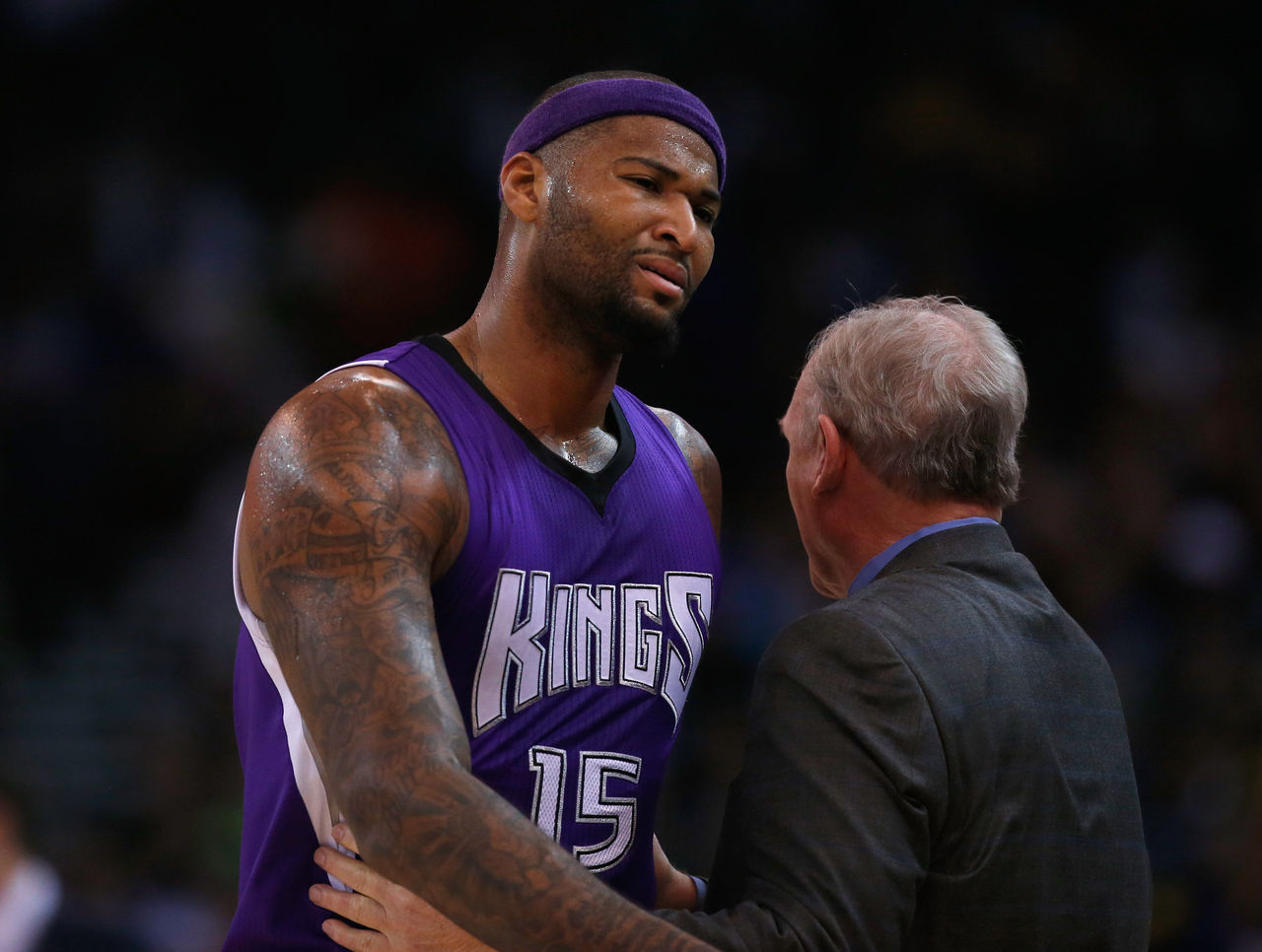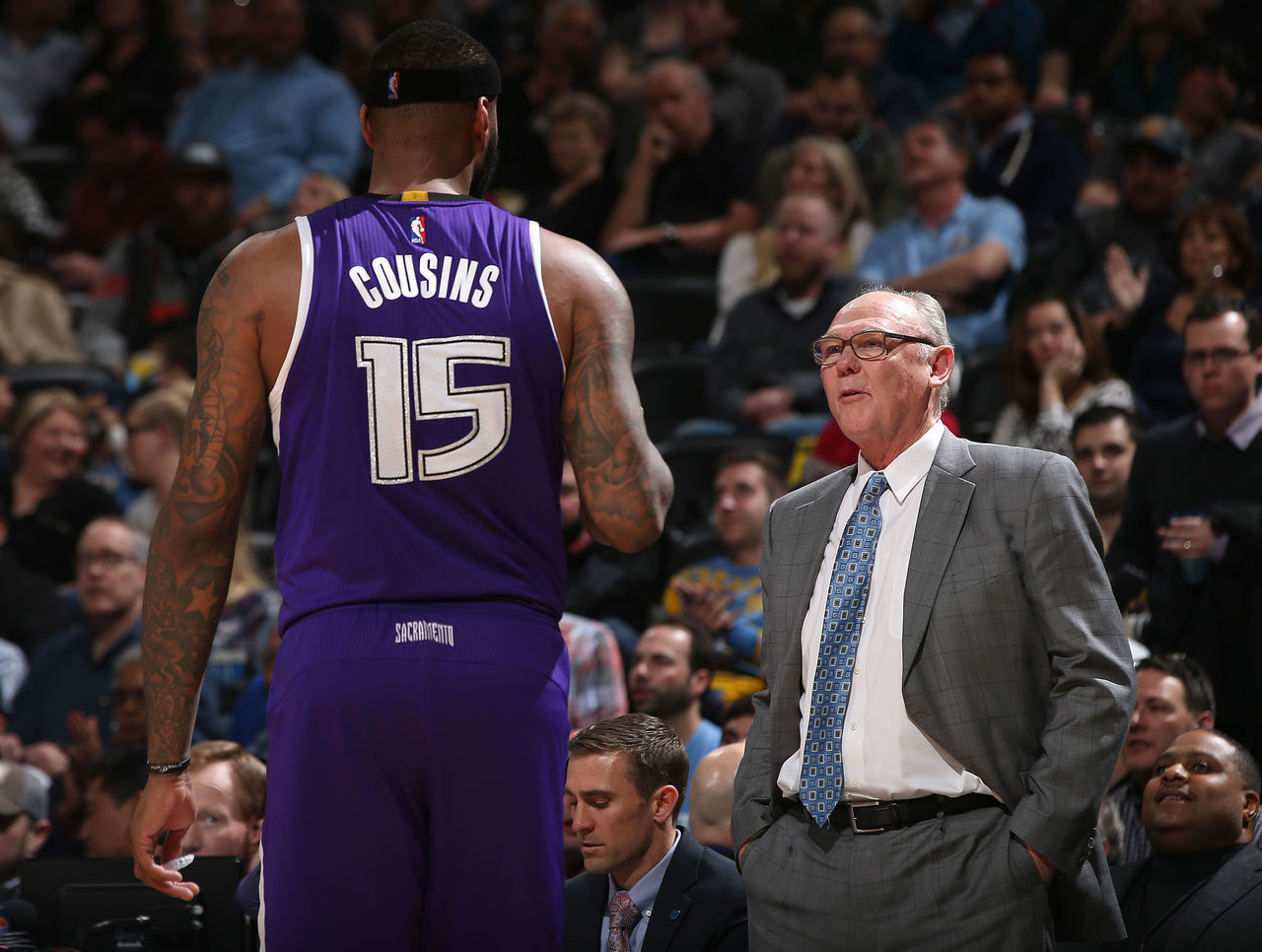The Kings need to choose between DeMarcus Cousins and George Karl

It's usually evident when a situation has reached a breaking point.
Whatever the reason for Demarcus Cousins' latest blowup at his Sacramento Kings coach, George Karl - reports have it that Cousins was frustrated Karl wasn't defending him against the referees - the writing is on the wall. Really, it's been there for some time, even if the Kings have willfully ignored it: Cousins and Karl cannot coexist.
The relationship was doomed from the start. Cousins' camp reportedly never wanted Karl hired in the first place. The Kings ignored him, signing Karl to a four-year deal last February, and the two have seemingly been at each other's throats ever since. Karl reportedly attempted to get Cousins dealt in the offseason. Cousins suggested Karl was a snake in the grass. Karl questioned Cousins' commitment. The two claimed to have smoothed things over. Then Cousins blew up at Karl after a loss just two weeks into the season. Again they seemed to put it behind them. Again it proved a tenuous peace. Now Cousins is ranting cryptically on social media.
Related: 5 moments that cemented DeMarcus Cousins' mercurial reputation
The Kings have to make a choice. The longer they let this plainly untenable situation fester, the worse it's going to get - whether that means wearing Karl thin or alienating Cousins, who may well be the most objectively talented player the franchise has ever had.
Vlade Divac, the team's vice president and nominal GM, is in many ways the man at the center of all this, caught in the crossfire of Cousins and Karl's feud. His patience in trying to let the situation breathe has been refreshing - given how the Kings' long-impulsive front office has created a culture of upheaval that's led to 11 coaches in the last 11 seasons - but it's occasionally bordered on dithering indecision. He was reportedly a hair's breadth from axing Karl at the All-Star break, then had a last-second change of heart. Through all the turmoil, he's remained admirably (if naively) optimistic that the pairing can work. But time hasn't been the antidote. The situation isn't resolving itself.

On its face, the choice here seems patently obvious. Unless you're talking about Gregg Popovich (and perhaps even then), a coach will never be as valuable as a superstar. And make no mistake, Cousins is a superstar: a quick, skilled, nimble, uber-strong, low-post force that's the closest thing we've seen to a second coming of Shaquille O'Neal. Karl is a good coach, with a long track record of NBA success, but he hasn't done anything revolutionary in Sacramento - neither with X's and O's or by bringing about a discernible cultural paradigm shift.
Karl has the Kings playing at the league's fastest pace, but there doesn't appear to be any rhyme or reason behind it. The team doesn't thrive on up-tempo basketball, and in Cousins, it has one of the league's most dominant half-court players. Karl seems to play fast for no other reason than he thinks that's what's expected - not unreasonable, considering owner Vivek Ranadive purportedly fired Mike Malone last season because he wouldn't play ball and speed up the pace.
Meanwhile, the Kings are turning the ball over at one of the league's highest rates, get burned in transition, and surrender more 3-point attempts and makes than any other team. Their defense has been a mess all season. To the extent that night-to-night effort and preparation can be attributed to coaching, Karl hasn't coaxed them out of his troops.
Nor has Cousins been the only player to take issue with him. He's reportedly had his run-ins with Rajon Rondo, as well, and recently took heat from first-year big man Willie Cauley-Stein. After Karl cited matchups as a reason for sitting Cauley-Stein in some games, the rookie responded: "I can guard five positions, so that's redundant ... There should be no matchup problems ever. So that's just an excuse I think. However, I'm not the coach."
For all that, there's a case to be made that given the drama and dysfunction, Karl hasn't had an opportunity to get comfortable or showcase what he's capable of. There were rumors of him potentially getting fired as early as five months after he was hired. His best player seemed to distrust him from the start. The front office's support of him has been flimsy, at best.

Meanwhile, Cousins has had some issue or other with every coach he's had in Sacramento, excepting Malone during the rosy 24-game start to last season before he was fired. For as talented as he is, Cousins hasn't proven an easy nut for NBA coaches to crack, and while the Kings haven't exactly put him in position to succeed, he has frequently set a poor example with his body language, lack of impulse control, and maddeningly inconsistent effort.
Since being drafted by the Kings in 2010, Cousins has earned negative attention (or team and league discipline) for incidents ranging from a confrontation with Spurs broadcaster Sean Elliott, to a groin shot on O.J. Mayo, to a locker-room dust-up with former coach Keith Smart, to throwing a punch at Patrick Beverley, to hurling Marcus Smart to the ground, to bopping Al Horford on the head. He's regularly among the league leaders in technical fouls.
He's shown a tendency to either lash out or shut down when things don't go to his liking, and it's fairly clear that if the Kings let Karl go, the next coach they bring in will have to come Cousins-approved. So, in a way, committing to Cousins as a player also means being beholden to his whims. He's been in the league six seasons and no team he's been on has won 30 games. At what point do the Kings decide the marriage is broken? At what point do they consider him part of the problem, and not the solution?
Unlike cutting ties with Karl, making Cousins available in a trade could actually change the course of the franchise in a meaningful way. He would net the Kings valuable long-term assets that would take them in a new, possibly healthier, more sustainable, more fruitful direction. Trading a superstar in his prime isn't an ideal way to improve a team's outlook, but it can work. One need only flip on a Minnesota Timberwolves game to see how.
Whichever way the Kings decide to go, they have to know they can't move forward with both Cousins and Karl; they have to pick one and lose the other. The sooner they decide, the better for everyone involved.
HEADLINES
- T-Wolves spoil Jokic's 61-point game on buzzer-beating foul shots in 2OT
- Betts, Dodgers improve to 7-0 as Braves stay winless
- Draisaitl, Pickard help Oilers defeat Golden Knights
- Padres continue franchise-best start with win over Guardians
- Bucks post highest single-game field-goal percentage in 21st century